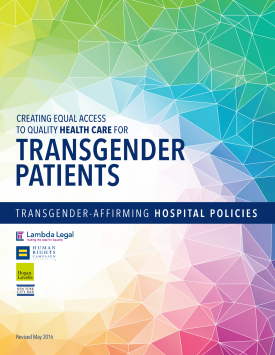Lambda Legal, the Human Rights Campaign (HRC) and the LGBT Rights Committee of the New York City Bar Association, with pro bono assistance from Hogan Lovells US, LLP, and Proskauer Rose LLP, today released an update to their ground-breaking 2013 publication that provided guidance to hospitals seeking to improve health care for transgender patients.
From M. Dru Levasseur, Director of the Transgender Rights Project at Lambda Legal:
Just last week, the U.S. Department of Health and Human Services finalized new rules confirming that lesbian, gay, bisexual and transgender (LGBT) people are protected against health care discrimination under Section 1557 of the Affordable Care Act. The recently released Obamacare rules confirm what we predicted three years ago: under the law, hospitals must treat transgender patients fairly, equitably and with respect.
These revised guidelines reflect the new landscape.
From Tari Hanneman, Deputy Director of the Foundation’s Health and Aging Program, and author of the HEI.:
Just 21 percent of hospitals participating in the HRC Foundation’s 2016 Healthcare Equality Index (HEI) had specific policies outlining procedures and practices to eliminate bias and insensitivity toward transgender patients. This revised publication will go a long way in helping more hospitals adopt crucial policies and practices to ensure that transgender patients are welcomed and treated with appropriate care.
From Anna M. Pohl, Chair of the New York City Bar Association's Committee on LGBT Rights:
The City Bar's LGBT Rights Committee has for years worked on issues that affect transgender individuals, including conducting a survey in 2011 of several New York City area hospitals that highlighted the need for the original report. We are pleased to have partnered with Lambda Legal and HRC on the updated version of this report, to reflect recent changes in the law and help hospitals provide state-of-the-art care to their transgender patients.
When first released in November 2013, the publication was a pioneering document designed for all hospital personnel seeking to align themselves with best practices in transgender care. It answered their questions about transgender patients, showed them how to reduce bias and insensitivity, and addressed key issues such as confidentiality, room assignments, bathroom access, and admitting/registration procedures. The guidance also included unique model policies that could be adapted to meet the needs of individual hospitals.
The intervening years have seen a significant change in the legal landscape concerning transgender rights in the health care context, including victories in court, new state insurance bulletins and evolving policies and best practices, culminating in the finalized HHS Section 1557 rules. The revised publication incorporates those changes, adds new policies and updates existing ones.
The revised guide includes new information about:
- Access to Hormone Therapy;
- Access to Personal Items that Assist Gender Presentation;
- Collection of gender identity data in electronic health records;
- Glossary of terms
The original publication followed Lambda Legal's landmark 2010 survey, When Health Care Isn't Caring, which showed that transgender and gender-nonconforming people experienced discrimination in healthcare and barriers to care two to three times more often than lesbian, gay, and bisexual people. In fact, 19 percent of the 6,000+ respondents in the 2011 National Transgender Discrimination Survey reported having been refused health care outright because of their transgender status, while 28 percent had postponed necessary care when they were sick or injured and 33 percent had delayed or not sought preventive care because of prior health care discrimination.
As the legal and regulatory landscape has changed, hospitals continue to seek advice on how best to implement these changes. This new publication, like its predecessor, authored by experts, will continue to play an important role in eliminating health disparities for transgender people, providing them with patient-centered care, and ensuring equity in the nation's healthcare system.





